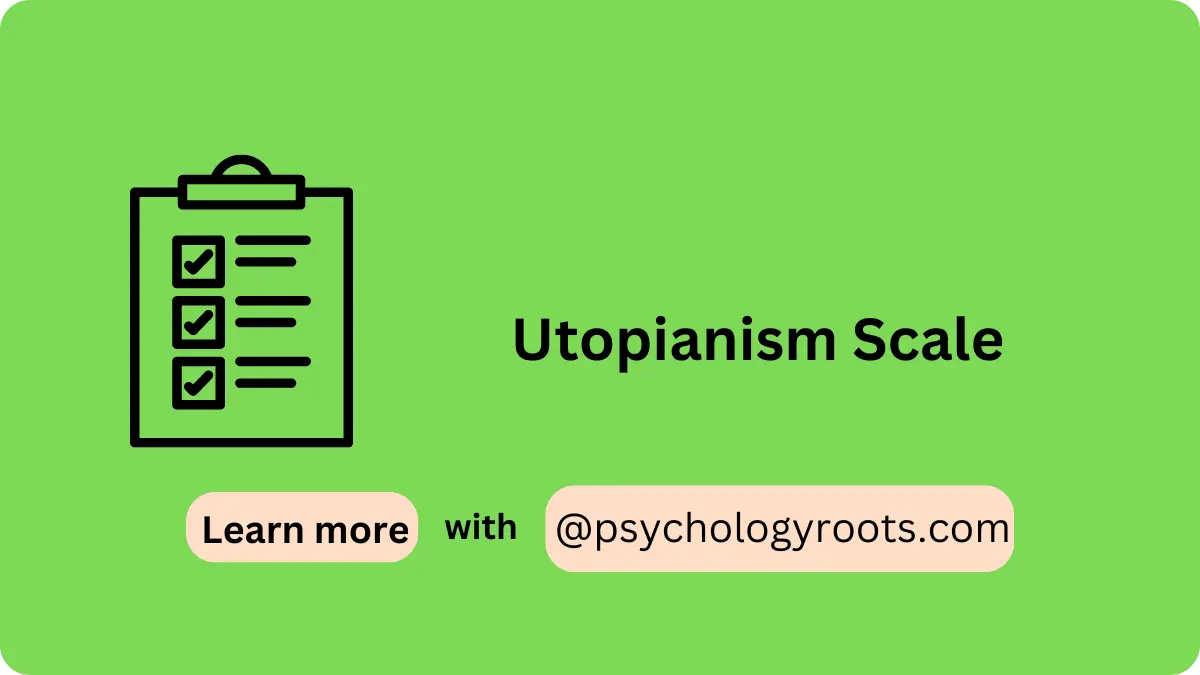Table of Contents
Utopianism Scale
Here in this post, we are sharing the “Utopianism Scale”. You can read psychometric and Author information. We have thousands of Scales and questionnaires in our collection (See Scales and Questionnaires). You can demand us any scale and questionnaires related to psychology through our community, and we will provide you with a short time. Keep visiting Psychology Roots.
About Utopianism Scale
Scale Name
Utopianism Scale
Author Details
James W. Fernando, Nicola Burden, Ann Ferguson, Lisa V. O’Brien, Martin Judge, and Yoshihisa Kashima
Translation Availability
Not Sure

Background/Description
The Utopianism Scale was developed by Fernando et al. (2018) to measure the extent to which individuals engage in utopian thinking, an idealized view of society or the future that can motivate efforts toward societal improvement. Utopianism is not merely about unrealistic fantasies but often serves as a powerful force for social and political engagement. The authors’ research emphasizes that individuals who engage in utopian thinking are more likely to be involved in efforts to bring about positive social change.
The scale is designed to evaluate individuals’ tendencies to think about idealized futures and how these thoughts drive their behavior in relation to societal and political engagement. The underlying theory posits that utopian thinking provides a psychological mechanism for navigating dissatisfaction with the current state of society, motivating people to envision and pursue a better world.
Administration, Scoring and Interpretation
- The scale is suitable for adults interested in assessing their engagement in utopian thinking, particularly in relation to social and political issues.
- The Utopianism Scale is a self-report questionnaire with items designed to capture how frequently individuals engage in utopian thoughts and how strongly they believe in the possibility of achieving an ideal society.
- Respondents are asked to rate how often they engage in idealized thinking about society and how much they believe in the potential for societal improvement.
- The scale uses a Likert-type format, with responses ranging from strongly disagree to strongly agree.
- Higher scores indicate a greater tendency toward utopian thinking and a stronger belief in the possibility of societal transformation.
- Scores on the Utopianism Scale reflect the degree to which individuals envision idealized futures and are motivated to engage in societal change. High scores suggest an inclination toward visionary thinking and proactive societal engagement, while lower scores may indicate more pragmatic or pessimistic views of societal change.
Reliability and Validity
The Utopianism Scale has demonstrated strong psychometric properties. It has been shown to correlate with measures of social and political engagement, supporting its construct validity. The scale also exhibits high internal reliability across various populations, making it a robust tool for studying the psychological and behavioral outcomes of utopian thinking.
- Reliability: The scale has demonstrated high internal consistency, indicating that it reliably measures the concept of utopianism.
- Validity: The scale’s construct validity has been confirmed through its positive association with other measures of societal engagement and visionary thinking.
Available Versions
9-Items
Reference
Fernando, J. W., Burden, N., Ferguson, A., O’Brien, L. V., Judge, M., & Kashima, Y. (2018). Functions of utopia: How utopian thinking motivates societal engagement. Personality and Social Psychology Bulletin, 44(5), 779-792.
Important Link
Scale File:
Frequently Asked Questions
Q: What does the Utopianism Scale measure?
A: The scale measures the frequency and strength of utopian thinking and its impact on societal and political engagement.
Q: Who can use the Utopianism Scale?
A: It is intended for adults, especially those interested in assessing their visionary thinking and motivation to engage in social change.
Q: How is the scale scored?
A: The scale uses a Likert-type format, with higher scores indicating stronger engagement in utopian thinking and a belief in the possibility of societal transformation.
Q: How does utopian thinking influence behavior?
A: According to Fernando et al. (2018), utopian thinking can motivate individuals to pursue societal improvement, leading to greater political and social involvement.
Q: Is utopian thinking realistic?
A: While utopian thinking may seem idealistic, it can serve as a psychological tool to motivate individuals toward positive change in society.
Disclaimer
Please note that Psychology Roots does not have the right to grant permission for the use of any psychological scales or assessments listed on its website. To use any scale or assessment, you must obtain permission directly from the author or translator of the tool. Psychology Roots provides information about various tools and their administration procedures, but it is your responsibility to obtain proper permissions before using any scale or assessment. If you need further information about an author’s contact details, please submit a query to the Psychology Roots team.
Help Us Improve This Article
Have you discovered an inaccuracy? We put out great effort to give accurate and scientifically trustworthy information to our readers. Please notify us if you discover any typographical or grammatical errors.
Make a comment. We acknowledge and appreciate your efforts.
Share With Us
If you have any scale or any material related to psychology kindly share it with us at psychologyroots@gmail.com. We help others on behalf of you.